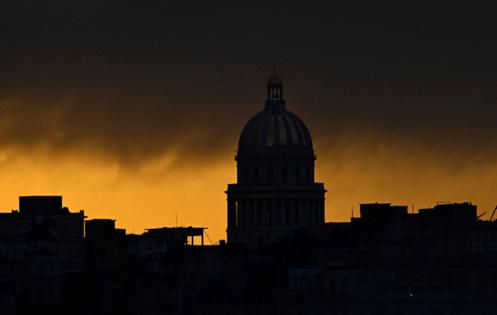5-year-old child is among the 6 dead left by Hurricane Oscar in Cuba amid power outage
Published in Weather News
A five-year-old girl and her mother, along with a 92-year-old man, are among the six people dead after Hurricane Oscar hit the coastal city of Baracoa and nearby areas in the eastern province of Guantánamo in Cuba as a Category 1 storm on Sunday, bringing heavy rains and flash flooding in a region that has been without electricity since Friday.
On Tuesday morning, local state television station Solvisión published the identities of the dead, all in San Antonio del Sur, a municipality in Guantánamo close to Baracoa: Liz Anyi Elías Labañino, 5, and her mother, Iriannis Labañino Domínguez, 31; Francisco Columbié Matos, 92; Esmerido Noa Fiffe, 86; Antolino Arias Domínguez, 83, and Alexander Savón Matos, 42.
Cuban authorities have not said how they died. Cuban leader Miguel Díaz-Canel broke the news about the deaths and said the town and nearby Imías, both on the southern coast of Guantánamo, had been severely affected by the storm and “there had been flood levels with no historical precedent in those two zones.”
In a publication on X, he referred to the two municipalities as normally being “dry zones.”
Armando Portela, the editor of the quarterly publication Cuba Geográfica, who is an expert on the island’s geography and is also a news editor for el Nuevo Herald, said the area is indeed “extremely dry, similar to a semi-desert.”
Because the towns were built on the southern side of the mountains, the climate is very dry because rain usually pours on the mountain’s northern side, a phenomenon known as “rainshadow.” But Portela said the area’s location on a narrow valley near the shallow river Sabanalamar is also “very dangerous at times of sudden, heavy rain” because it can easily flood.
“In the past, the government usually evacuated everyone, even the cattle, and it was mandatory,” he said.
The lack of electricity made any efforts at evacuation more difficult this time. After years of neglect, the country’s grid collapsed on Friday, causing a nationwide blackout. The state-run utility Electric Union said Tuesday morning that 70% of clients in the country have service. But Guantánamo, where the storm hit, and Santiago de Cuba, another province in eastern Cuba, remained mostly without electricity.
In recent years, what used to be a well-organized Civil Defense system directed by the Cuban military has suffered from a lack of resources and poor planning. In 2017, authorities waited too long to issue a hurricane warning for central Cuba just hours before Hurricane Irma trashed the region as a Cat 5 storm. Cuba was caught by surprise when Irma’s storm surge caused severe flooding in Havana. Though Cuban authorities said at the time they had evacuated a million people, 10 people died.
Citing a Civil Defense official, the Communist Party daily Granma reported Tuesday that by Sunday afternoon, 9,000 people had been evacuated in Imías and another 6,000 in San Antonio del Sur before Oscar hit.
A local government official in Maisí, on the eastern tip of the island, said 8,904 people had been evacuated, most of them to relatives’ and neighbors’ homes.
Another unidentified local official told Primada Visión, a local state television station in Baracoa, on Sunday that the government wanted to complete evacuations “in the province but mainly in Baracoa and Maisí” before the afternoon. Oscar made landfall near Baracoa around 5:50 p.m.
State media showed photos of rescue operations of people trapped by flooding in Guantánamo province. Díaz-Canel said the Revolutionary Armed Forces and the Interior Ministry were deployed in such operations and that the wreckage left by the storm had cut off access to some areas.
Baracoa and Imías were devastated in 2016 by Hurricane Matthew, which destroyed thousands of homes and other buildings in the region.
Some residents in Baracoa complained on the Facebook page of Primada Visión that hurricane warnings did not reach the public and that government officials were notably absent in the aftermath of the storm.
“There was no information from the civil defense, thousands of people were uninformed, and at this point no municipal or national official has cared to know what has happened in the municipality,” said one of the residents. “The streets still have fallen poles and wires, rubble everywhere and no one has cared about anything.”
_____
©2024 Miami Herald. Visit miamiherald.com. Distributed by Tribune Content Agency, LLC.







Comments